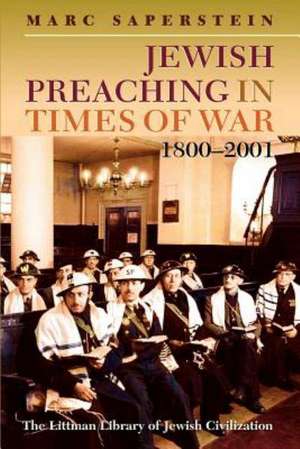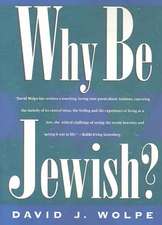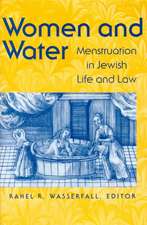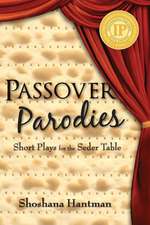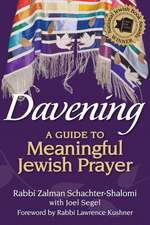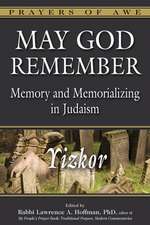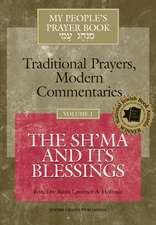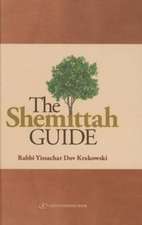Jewish Preaching in Times of War, 1800-2001
Autor Marc Sapersteinen Limba Engleză Paperback – 23 aug 2012
Preț: 320.44 lei
Nou
Puncte Express: 481
Preț estimativ în valută:
61.32€ • 66.81$ • 51.67£
61.32€ • 66.81$ • 51.67£
Carte tipărită la comandă
Livrare economică 23 aprilie-07 mai
Preluare comenzi: 021 569.72.76
Specificații
ISBN-13: 9781906764401
ISBN-10: 1906764409
Pagini: 648
Dimensiuni: 156 x 234 x 33 mm
Greutate: 0.89 kg
Editura: Littman Library of Jewish Civilization
ISBN-10: 1906764409
Pagini: 648
Dimensiuni: 156 x 234 x 33 mm
Greutate: 0.89 kg
Editura: Littman Library of Jewish Civilization
Notă biografică
Marc Saperstein is Professor of Jewish History and Homiletics at Leo Baeck College, London, where he was formerly principal, and Visiting Professor of Jewish Studies at King's College London. His other books include Jewish Preaching, 1200 - 1800 and 'Your Voice Like a Ram's Horn': Themes and Texts in Traditional Jewish Preaching, both of which won National Jewish Book Awards.
Cuprins
Note on Editorial Practice Note on Transliteration Introduction: Modern Jewish Preaching Part I The Wars of the Napoleonic Era 1 Isaac Luria, 'A Penitential Sermon', 19 October 1803, London 2 Solomon Hirschel, Sermon of Thanksgiving 'for the Success of His Majesty's Fleet ... off Trafalgar', 5 December 1805, London 3 Gershom Mendes Seixas, 'Fast Day Sermon', 2 February 1814, New York Part II The Wars of the Mid-Nineteenth Century 4 David Woolf Marks, 'God Protects our Fatherland', 7 October 1857, London 5 M. J. Michelbacher, 'A Sermon Delivered on the Day of Prayer', 27 March 1863, Richmond, Virginia 6 Sabato Morais, 'Sermon for the National Fast-Day', 30 April 1863, Philadelphia 7 Samuel Myer Isaacs, 'Fast-Day Sermon', 30 April 1863, New York 8 David Einhorn, Two Civil War Sermons: a. 'Sermon Delivered on Thanksgiving Day', 26 November 1863, Philadelphia b. 'War with Amalek!', 19 March 1864, Philadelphia 9 Isaac Mayer Wise, 'The Fall of the Second French Empire', 9 September 1870, Cincinnati 10 Benjamin Artom, 'The War', 17 September 1870, London 11 Sabato Morais, 'Thanksgiving Day Sermon', 24 November 1870, Philadelphia Part III The Wars of the Late-Nineteenth Century 12 H. Pereira Mendes, 'The Plague of Inconsistency' (selections), 23 April 1898, New York 13 Joseph Krauskopf, 'A Time of War, and a Time of Peace', 1 May 1898, Philadelphia 14 Hermann Adler, 'Judaism and War', 4 November 1899, London Part IV The First World War 15 George (Gedaliah) Silverstone, 'On the Terrible War of 5675', 25 October 1914, Washington, DC 16 Morris Joseph, 'Christmas and War', 25 December 1915, London 17 Joseph H. Hertz, 'Through Darkness and Death unto Light', 1 January 1916, London 18 J. Leonard Levy, 'A Time for War, and a Time for Peace', 8 April 1917, Pittsburgh 19 Stephen S. Wise, 'Can We Win the War without Losing America?', 20 May 1917, New York 20 Hermann Gollancz, 'Nationalism within Bounds', 7 September 1918, London 21 Leo M. Franklin, 'The Lure of Peace', 13 October 1918, Detroit Part V The Second World War 22 Abraham H. Feinberg, 'America's Hour of Decision', 19 September 1939, Rockford, Illinois 23 Jacob Philip Rudin, 'God in the Blackout', 2 October 1940, Great Neck, New York 24 Eliezer Berkovits, Two Second World War Sermons: a. 'On a Strategy of Faith', [3] May 1941, Leeds b. 'Triumph of the Spirit', 7 September 1941, Leeds 25 Maurice N. Eisendrath, 'Blackout: How Long, O Lord, How Long?' 21 September 1941, Toronto 26 Israel H. Levinthal, 'Is It Death or Rebirth of the World that We Behold?' 22 September 1941, New York 27 Ferdinand M. Isserman, 'The United States Is at War', 12 December 1941, St Louis 28 Joseph H. Hertz, 'Civilian Morale', 2 April 1942, London 29 Walter Wurzburger, 'The Individual in the Crisis', 9 October 1943, Brighton, Massachusetts 30 Roland B. Gittelsohn, 'The Birth of a New Freedom', 14 March 1945, Iwo Jima Part VI Wars of the Later Twentieth Century 31 Roland B. Gittelsohn, Two Vietnam War Sermons: a. 'Will There Be a Tomorrow?', 26 September 1965, Boston b. 'Answer to an Anonymous Letter', 26 November 1965, Boston 32 Colin Eimer, 'The Falklands Crisis', 14 May 1982, Enfield, London 33 Immanuel Jakobovits, 'The Morality of Warfare', 25 May 1982, London Part VII Responses to 9/11 34 Three Sermons: a. Elias Lieberman, 'A Sermon', 14 September 2001, Cape Cod, Massachusetts b. Alexandra Wright, 'New York: 11 September 2001', 18 September 2001, Radlett and Bushey, Hertfordshire c. Barry Freundel, 'Twin Towers of Smoke', 15 September 2001, Washington, DC Bibliography Source Acknowledgements Index of Passages Cited General Index
Recenzii
'In this rich collection of nineteenth- and twentieth-century sermons, Marc Saperstein demonstrates both the enduring rhetorical power of Jewish preaching and the value of the sermon as window onto Jewish history ... a compelling selection ... He argues persuasively that Jewish preachers often found themselves confronted with the challenge of interpreting difficult moral and political questions for their congregations but that these questions took on particular urgency in moments of military conflict ... In reading through this provocative collection of British and American sermons there are times when one wishes for more ... Given the value of the material Saperstein presents here, one can only hope that other such studies will follow.' Jessica Cooperman, American Jewish Archives Journal 'Sermons brilliantly anthologized by Marc Saperstein ... rich collection. The very nature of the book's core source material - originally addressed to the Jewish masses - renders this book eminently accessible and of natural interest to a very broad readership. At the same time, Saperstein's extensive historical introductions to each of the sermons, along with his erudite annotations of these texts, will be of enormous value to scholars of modern Jewish theology and history.' Allan Nadler, Forward 'Students and scholars of the history of preaching will find it invaluable. The footnotes and introductions that comprise nearly half the book are a scholarly tour de force and the 72-page Introduction to the book as a whole is a riveting overview of elements of Jewish preaching in America and Great Britain and a stunning example of the use of sermons as data in a broader history of the intersection between religious groups and civic life. Margaret Moers Wenig, Homilectic 'Immensely readable ... a pioneering contribution to the social, religious, and political history of Anglo-Jewry.' Jeffrey Cohen, Jewish Chronicle 'Marc Saperstein has virtually created a new field of Jewish studies: the scientific study of sermons ... for having brought together, across the denominational lines that usually separate them, some of the great voices of the past and for having studied their word carefully, both in terms of their context and in terms of what they have to say to us today, we owe Saperstein our gratitude. he has made a genuine contribution to the study of a little-known field of Jewish scholarship.' Jack Riemer, Palm Beach Jewish Journal
